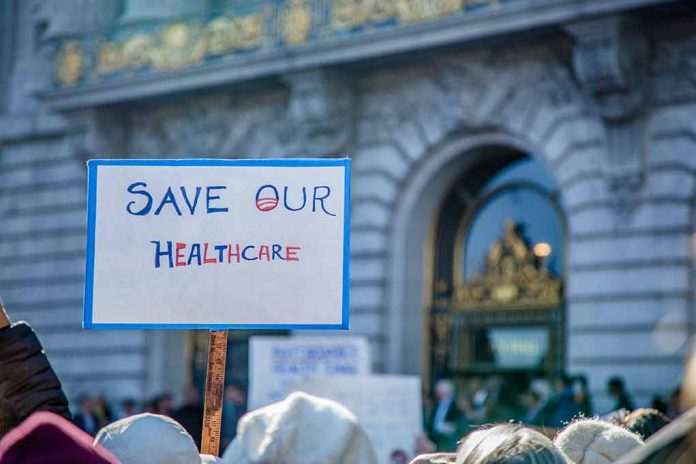
A federal court in North Dakota has halted the extension of Obamacare benefits to DACA recipients, sparking renewed debate over healthcare access for undocumented immigrants.
At a Glance
- Federal judge blocks Affordable Care Act (ACA) coverage for “Dreamers” in 19 states
- Judge rules Centers for Medicare and Medicaid Services (CMS) lacks authority to redefine “lawfully present” status
- Decision affects an estimated 100,000 DACA recipients who could have gained health coverage
- Kansas Attorney General Kris Kobach praises ruling as upholding “rule of law”
- Biden administration’s attempt to expand ACA eligibility faces significant legal setback
Court Ruling Blocks ACA Coverage for DACA Recipients
U.S. District Judge Daniel M. Traynor has issued a preliminary injunction preventing the federal government from extending Affordable Care Act (ACA) coverage to recipients of the Deferred Action for Childhood Arrivals (DACA) program in 19 states. The ruling comes as a significant setback to the Biden administration’s efforts to expand healthcare access for undocumented immigrants who arrived in the United States as children.
The court’s decision stems from a lawsuit filed by Kansas and 18 other states challenging the federal government’s rule to include DACA recipients in ACA eligibility. Judge Traynor granted the stay against the Biden administration’s rule, which was announced in May and aimed to allow DACA recipients to enroll in ACA health plans and receive financial assistance.
Federal judge temporarily blocks Dreamers from accessing Obamacare https://t.co/ovMVfRFMuU
— Just the News (@JustTheNews) December 10, 2024
Legal Basis and Implications
At the core of the ruling is the interpretation of “lawfully present” status under health care law. Previously, DACA recipients were not considered “lawfully present,” affecting their eligibility for ACA coverage. The Department of Health and Human Services had attempted to modify this definition to include DACA recipients, a move that Judge Traynor deemed beyond the agency’s authority.
“The authority granted to CMS by the ACA is to ascertain whether an individual meets the requirements for lawful status. It by no means allows the agency to circumvent congressional authority and redefine the term ‘lawfully present,'” Judge Traynor stated in his ruling.
The decision emphasizes that the power to define legal status rests with Congress, not executive agencies. This interpretation could have far-reaching implications for future attempts to expand federal benefits to undocumented immigrants through executive action.
Reactions and Potential Impact
Kansas Attorney General Kris Kobach, who led the legal challenge, hailed the ruling as a victory for the rule of law. Kobach argued that Congress never intended for illegal aliens to receive Obamacare benefits, citing existing laws that prohibit such provisions. “This decision is a big win for the rule of law. Congress never intended that illegal aliens should receive Obamacare benefits. Indeed, two laws prohibit them from receiving such benefits. The Biden administration tried to break those laws. But we fought back and defeated the Biden Justice Department.”
The ruling’s impact is substantial, potentially affecting up to 100,000 uninsured DACA recipients who could have gained health coverage under the proposed rule. The 19 states involved in the lawsuit argued that expanding ACA coverage to DACA recipients would impose additional administrative and resource burdens on their healthcare systems.
Looking Ahead
As the legal battle continues, the future of healthcare access for DACA recipients remains uncertain. The Centers for Medicare and Medicaid Services has stated that it is reviewing the court’s decision but has not commented on potential next steps or appeals. The Department of Justice has yet to respond to requests for comment on the ruling.
This case highlights the ongoing challenges faced by the DACA program, which was initiated by President Obama to protect certain individuals from deportation and allow them to work legally in the U.S. However, the program does not grant eligibility for government-subsidized health insurance, a point of contention that continues to fuel legal and political debates.
As both sides prepare for potential further legal action, the case underscores the complex intersection of immigration policy, healthcare access, and the limits of executive authority in addressing these critical issues.
Sources:
Federal court blocks ACA coverage for Dreamers
Court Temporarily Blocks Obamacare Coverage to Dreamers in 19 States



